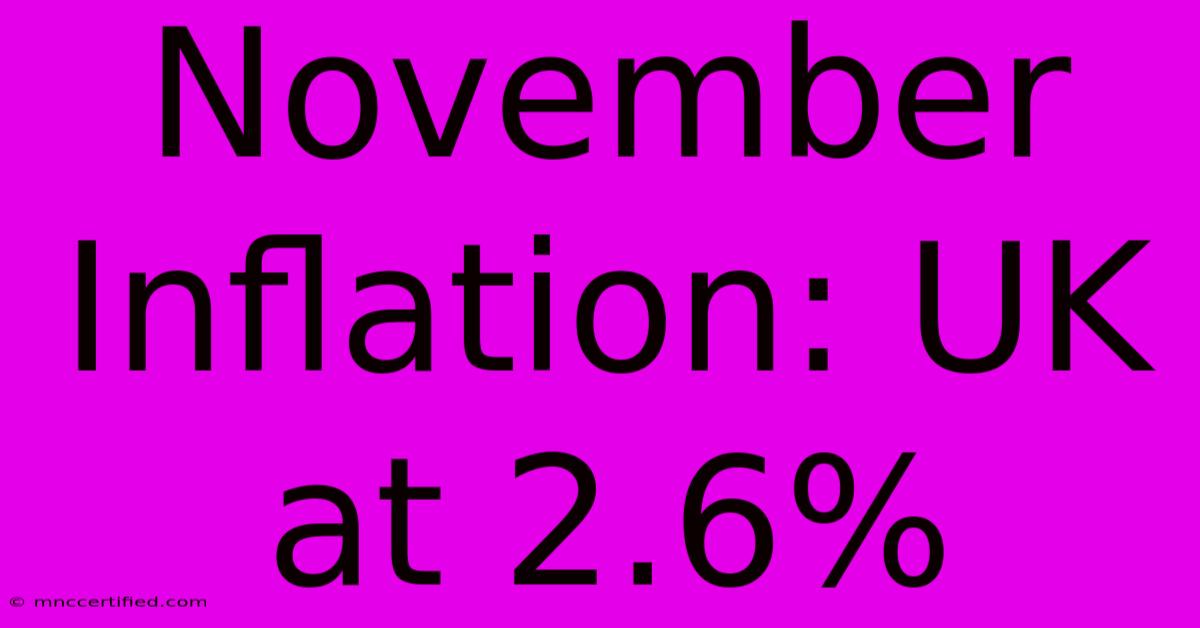November Inflation: UK At 2.6%

Table of Contents
November Inflation: UK Remains Steady at 2.6% - What Does it Mean?
The UK's inflation rate held steady at 2.6% in November, according to the Office for National Statistics (ONS). While this figure remains below the Bank of England's 2% target, analysts are closely examining the underlying factors and potential future implications for the UK economy. This article delves into the details of November's inflation figures, exploring contributing factors and predicting potential future trends.
A Closer Look at the November Inflation Data
The ONS reported a consistent 2.6% inflation rate for November, a figure that has remained relatively stable for several months. This stability, however, doesn't necessarily signal a lack of economic movement. Understanding the nuances within the data is crucial.
Key Contributing Factors:
- Energy Prices: While energy prices have shown some fluctuation, their overall impact on the inflation rate remained relatively consistent in November. This stability, however, could be temporary. Future price changes in energy markets remain a significant variable to watch.
- Food Prices: Food prices continue to be a contributing factor to inflation, though their impact has shown slight moderation in recent months. Changes in global supply chains and domestic agricultural production significantly influence this area.
- Core Inflation: Core inflation, which excludes more volatile items like energy and food, provides a more stable picture of underlying price pressures. Tracking core inflation offers valuable insights into the longer-term inflationary trends within the UK economy.
- Second-hand Car Prices: The used car market continues to influence the overall inflation figures. Supply chain disruptions and increased demand have contributed to price volatility in this sector.
Implications for the UK Economy
The consistent 2.6% inflation rate raises several questions about the UK's economic outlook.
- Bank of England Policy: The Bank of England's monetary policy will be heavily influenced by inflation trends. Maintaining a stable inflation rate is a primary objective. Any significant shifts in inflation could trigger adjustments to interest rates or other monetary policy tools.
- Consumer Spending: Inflation directly impacts consumer spending. Sustained inflation can erode purchasing power, potentially leading to reduced consumer confidence and slower economic growth.
- Wage Growth: Wage growth needs to keep pace with inflation to maintain real earnings. A significant gap between wage growth and inflation can negatively affect household budgets and overall consumer confidence.
Future Predictions and What to Watch For
Predicting future inflation with complete accuracy is impossible. However, several factors will play a crucial role in shaping the UK's inflation trajectory in the coming months:
- Global Economic Conditions: Global economic events, such as supply chain disruptions or shifts in commodity prices, will significantly influence UK inflation.
- Government Policies: Government policies, including taxation and spending measures, can also impact inflation.
- Brexit Impact: The ongoing effects of Brexit continue to be a factor affecting the UK economy and, consequently, inflation.
Conclusion: Navigating the Inflation Landscape
The UK's consistent 2.6% inflation rate in November presents a complex picture. While stability is apparent, the underlying factors require careful monitoring. The interplay between energy prices, food costs, core inflation, and global economic conditions will significantly determine the future direction of inflation in the UK. Staying informed about these factors is crucial for businesses, consumers, and policymakers alike. Further analysis and updates from the ONS will be essential in providing a clearer understanding of the long-term economic implications.
Keywords: UK inflation, November inflation, inflation rate, Bank of England, ONS, economic growth, consumer spending, wage growth, energy prices, food prices, core inflation, Brexit, monetary policy, supply chain, economic outlook
Meta Description: UK inflation remains steady at 2.6% in November. This article analyzes the contributing factors, implications for the economy, and potential future trends. Learn more about the UK's economic outlook.

Thank you for visiting our website wich cover about November Inflation: UK At 2.6%. We hope the information provided has been useful to you. Feel free to contact us if you have any questions or need further assistance. See you next time and dont miss to bookmark.
Featured Posts
-
2025 Simpsons Exit Channel 4
Dec 18, 2024
-
Pilots Adjustments Safe Landing
Dec 18, 2024
-
Cavendish Spoty Award Competitors View
Dec 18, 2024
-
Fortnite Skibidi Toilet Collaboration Leak
Dec 18, 2024
-
Schwarzeneggers Christmas Look
Dec 18, 2024